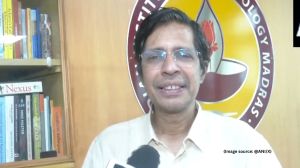‘Enlightened citizens can help deal with terrorist situations’
Apart from the usual tools of negotiation, public figures with impeccable moral credentials should be used to intervene in problems and bring about harmony

I would like to share with you the cruel incident which took place in Afghanistan and has resulted in the loss of a precious engineer, Suryanarayana, resulting in the loss of smiles on the faces of his family including his three small children. While condemning this inhuman act, many nations have the collective responsibility to devise a mechanism to see that such situations do not occur in the future for any citizen of India and also for any person belonging to any part of the world.
Many countries including ours are facing such situations. There are certain people in certain societies who are violent and they don’t follow any rule of law, they don’t abide by any code of conduct. The light of conscience is extinguished in them. Even where we have taken actions against terrorists through political, military and police methods we have not been able find a solution in full and solutions are evading us.
In all our actions, we have to consider the injection of certain higher elements. I would like to give my thoughts on this issue. This I would illustrate through two events which influenced me, one during my childhood, another recently that I have come across.
I would like to narrate an incident in 1947, which inspired me when I was a young boy. On August 15 1947, my high school teacher took us to hear the midnight freedom speech of Pandit Jawaharlal Nehru. We were all thrilled when Panditji spoke and the mission was achieved. Subsequent to that, we had a great learning from my teacher Rev. Iyyadorai Solomon.
He brought two newspaper clippings and narrated two incidents, which touched my heart. The first was a news item and the most important one which has been embedded in my memory was about Mahatma Gandhi, walking barefoot in Noakhali in Bengal in November 1946, removing the pain of riot-affected people. Our teacher said, ‘‘Great leaders are not afraid of problems. He is at the place of pain at risk to his life to remove pain and give relief.’’
The other incident was India achieving freedom and Panditji’s speech. As Father of the Nation, Mahatma Gandhi should have been the first to unfurl the national flag on August 15, 1947 from the Red Fort. But he was not there. Instead he was comforting people who were suffering. Mahatma Gandhi had created and nurtured a leadership who could take charge of the nation during the freedom celebrations, when he was busy removing the pain of the people. Mahatma Gandhi was an embodiment of nobility, elevated thinking and a leader with great concern for the sufferings of human beings.
My teacher, after showing these two clippings, told the students how the Father of the Nation was a role model for providing leadership to the nation. We need such leaders who can influence people across the world to shun violence and terrorism, who are not governed by any rule of law.
Now for the second incident, how a mother’s teaching to a son was a source of inspiration to him and in turn established that truth triumphs in reforming hardcore militant robbers.
This story surrounds the life of the great saint Sheikh Abdul Qadir Al-Gelani, and took place about 1,000 years ago. One day, the child Abdul Qadir was grazing his cows when one of the cows looked at him and said, ‘‘What are you doing here in the grazing fields, it is not for this that you have been created.’’ Utterly terrified, Abdul Qadir ran back to his house and climbed on to the roof. From there he saw a large group of people returning from Arafat Mountain, thousands of miles away from his place in the neighbourhood of Mecca after performing Haj.
The bewildered Abdul Qadir went to his mother and asked her permission to make a journey to Baghdad in order to pursue a career in knowledge. She understood the divine call and promptly gave him permission to go. She gave him 40 gold coins, which was his share of inheritance from his father, stitched these 40 gold coins inside the lining of his coat and gave him permission to leave. When she stepped out of the door to bid him farewell, she said, ‘‘I have detached myself from you for the sake of Allah knowing that I shall not see your face again until the day of the last judgment. But take one advice from me: always feel the truth, speak the truth and propagate truth even when your life is at stake.’’
Then Abdul Qadir traveled with a small caravan heading for Baghdad. During the journey, when the caravan was passing through the tough terrain, a gang of robbers on horses suddenly attacked the caravan and started looting it. None of them however took the slightest notice of Abdul Qadir, until one of the looters turned to him and said. ‘‘Do you have anything with you?’’ Abdul Qadir replied, “I have got 40 gold coins which are stitched by my mother in the lining of my coat underneath my armpit.” The robber smiled and thought that Abdul Qadir was joking. He left him alone and moved elsewhere.
When their leader came the looters took Abdul Qadir to him and said to him, “This poor boy claims that he is in possession of 40 gold coins. We looted everybody but we have not touched him because we hardly believe that he has got gold coins with him”. Then the leader put the same question to Abdul Qadir, who replied in the same way. Then the leader ripped through his coat and discovered that he indeed had 40 gold coins inside the lining of his coat.
The astonished leader asked Abdul Qadir what prompted him to make this confession. He replied: ‘‘My mother made me promise that I will always be truthful even at the cost of my life. Here, it was a matter of only 40 gold coins. I promised her and never betrayed her trust, so I told the truth.’’
The looters started weeping and said, ‘‘You have adhered to the advice of your great mother but we have been betraying the trust of our parents and the covenant of our Creator for many years. From now onwards, you would become our leader in our repentance’’, and they decided to give up robbery and from that day became righteous persons.
These two incidents gives me the thought that apart from finding military, diplomatic and social solutions for containing the problems of terrorism and violence, we should encourage good human beings and enlightened citizens across the world to intervene in such problems to bring universal peace and harmony at the appropriate time for finding a lasting solution. In modern times how do we bring this type of transformation? We need to reassure our youth that the system of governance is with those who are truthful and dutiful.
(Based on President A P J Abdul Kalam’s address during the presentation of the Kabir Puraskar and the National Communal Harmony Awards for 2005 in New Delhi on May 1)
Photos


- 01
- 02
- 03
- 04
- 05





























